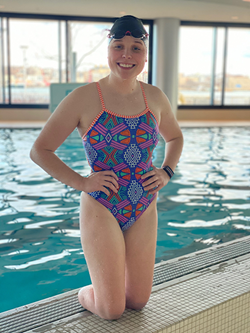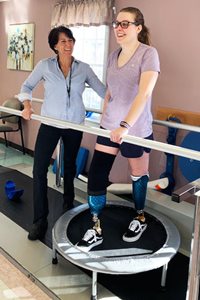 When Morgan Stickney was 10 years old, she took up competitive swimming. She was not very good at it. “At first, I came in 73rd of 75,” she recalls. “But I fell in love with it and was recognized for being the most dedicated swimmer. I never missed a practice for two years straight.”
When Morgan Stickney was 10 years old, she took up competitive swimming. She was not very good at it. “At first, I came in 73rd of 75,” she recalls. “But I fell in love with it and was recognized for being the most dedicated swimmer. I never missed a practice for two years straight.”
That kind of determination has served her well in facing unimaginable adversity. Stickney, now in her 20s, is an elite athlete and a double, below-the-knee amputee. “When I lost my left leg, I moved to the Olympic Training Center and was ranked number one in the U.S. and 12th in the world.” Prior to the COVID-19 pandemic, she was hoping to go to the 2020 Paralympics, “but then I lost my right leg.”
Stickney has an extremely rare genetic mutation that affects the arteries in her legs. In fact, hers is the first case like it documented in the U.S. Yet, despite the amputations and numerous other surgeries, the NH native returned to college, taking online classes for her pre-med work at California’s Biola University. She also got back in the pool and set a goal to start running, with the help of physical therapist Liane St. John at CMC Outpatient Rehabilitation.

“We’re working on going from a waddle to a walk, being able to use my prostheses as if they’re normal feet,” she says. Stickney gets regular prosthetic care at Next Step Bionics and Prosthetics in Manchester and is looking forward to a pair of “running legs” from the Born to Run Foundation, founded by CMC Outpatient Rehabilitation alum Noelle Lambert.
“Yes, Morgan can do anything she puts her mind to,” St. John states in amazement. “That positivity is really important for her recovery. She always comes in smiling and with every progressive task we throw at her she asks ‘what’s next,’ keeping us on our toes to meet her weekly goals. She wants to work hard and inspires not only other amputee patients but anyone in her presence.”
Stickney’s story has been shared all over the country, being featured on national television as well as in the New York Times and Boston Globe. But, she says, “It’s funny for me to be called an inspiration because I don’t look at myself that way. I’m strong and brave, but I don’t look at myself as an inspiration.”
She does, however, have two pieces of advice for anyone going through a challenging experience. “Embrace being different. If you go through something traumatic and can embrace being different, it changes the situation for you.”
And the second piece of advice? “Remain positive. If you’re negative, the situation won’t get any better; but if you’re positive and surround yourself with positive people, you’ll enjoy life more. Life is difficult and sometimes things get thrown at us that we think we can’t handle, like my own situation. Ten years ago, I would have without a doubt told you I couldn’t comprehend or handle being a bilateral amputee, but today it is my life. So remain positive because you will eventually find that light at the end of the tunnel.”